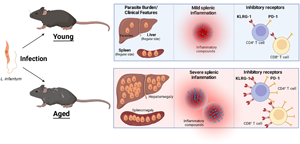Published online by Cambridge University Press: 07 June 2022

It is well accepted that the impact of diseases is generally more detrimental in elderly individuals than in younger ones. Changes in the immune system due to ageing can directly affect the ability to respond effectively to infections and may contribute to the higher morbidities and mortalities in the elderly population. Leishmaniasis is a complex of clinically unique diseases caused by obligate intracellular protozoa belonging to genus Leishmania, wherein visceral leishmaniasis (VL) is the most severe form and is fatal if left untreated. In this study, aged mice (72 weeks old) presented increased susceptibility to L. infantum infection compared to younger mice (4–6-week-old), with notable parasitism in both the spleen and liver, as well as exhibiting hepatosplenomegaly. A pronounced inflammatory profile was observed in the aged-infected mice, with excessive production of TNF-α and nitrite, along with diminished IFN-γ production and reduced proliferative capacity of T cells (assessed by expression of the Ki67 marker). Additionally, both CD4+ and CD8+ T cells from the aged-infected mice presented increased expression of the inhibitory receptors PD-1 and KLRG1 that strongly correlated with the parasitism found in the liver and spleen of this group. Overall, the data reported in this study suggests for the first time that ageing may negatively impact the VL outcome and provides a perspective for new therapeutic strategies involving manipulation of immunosenescence features against Leishmania infection.